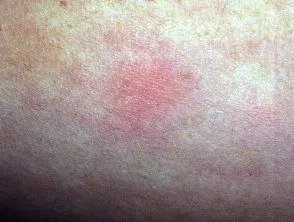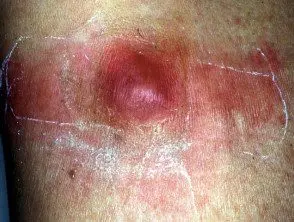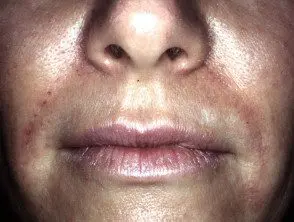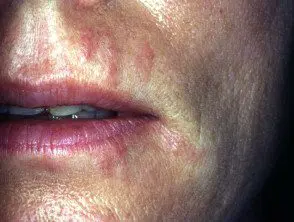What is it collagen Replacement therapy?
Collagen replacement therapy It is a safe, non-surgical procedure that smoothes out lines and furrows on the face.
Small amounts of collagen are injected under the line or scar through very narrow gauge needles, increasing the skin's natural collagen. The effects can be maintained with small "recharge" collagen injections two or three times a year.
What is collagen?
Collagen is a natural substance found in skin, muscles, tendons, and bones and provides structural support. At dermis (the middle layer of the skin), collagen is made up of fibroblasts cells. It forms a fibrous network in which new cells can grow. Through natural aging processes, collagen in the dermis is gradually lost and contributes to the formation of facial lines.
Injectable Bovine Collagen is made from sterile, purified cowhide collagen. Human Collagen Implants are highly purified and isolated from human skin grown in a laboratory. The cells have been cultured for the past ten years or so primarily to make live equivalents of skin to treat burns and ulcers.
When injected into the skin of the body, both forms of collagen are accepted as if they were the body's collagen, forming a network of collagen fibers.
Zyderm® and Zyplast® are popular brands of injectable bovine collagen. Others include Resoplast®. Human collagen brands include Dermalogen®, Cymetra ™, CosmoDerm®, and CosmoPlast®.
Zyderm® and Cosmoderm® are used for fine lines, and Zyplast® and CosmoDerm® are used for deeper furrows.
There are also products derived from porcine collagen, including Evolence ™ and Fibrel®. Fibrel is injected with the patient serum. The injections are said to be quite painful and can cause allergic reactions.
A person's skin can be used to produce fibroblast cultures (Isolagen®) or a collagen suspension (Autologen®). It can also be mixed with synthetic PMMA beads (Artecoll®).
Where can collagen implants be used?
Collagen injections can be used to improve the contour of the skin and fill in depressions in the skin due to scars, injuries, or lines.
Facial lines and features that can be smoothed with collagen implants include:
- Fine lines that extend between the eyebrows (glabellar lines)
- Smoker lines that are vertical lines in the mouth (perioral lines)
- Puppet lines at the corner of the mouth (oral commissures)
- Lines of concern across the forehead (forehead lines)
- The crow's feet in the corner of the eyes (periorbital lines)
- Deep smile lines that run from the side of the nose to the corners of the mouth (nasolabial folds)
- Cheek depressions
- Redefining the edge of the lip
-
Acne scars (collagen is not suitable for narrow "ice pick" scars)
- Other facial scars, as long as they don't have a sharp edge.
Collagen treatment can be combined with other cosmetic procedures, including botulinum. toxin injections and To be Coating.
Am I suitable for collagen replacement therapy?
Your doctor will take a complete medical history. Medicines that reduce the formation of blood clots, such as aspirin, anti-inflammatory agents, warfarin and some herbal medications, can increase the chances of bleeding. People with serious allergies (anaphylaxis) or allergy Injected local anesthetics should not be treated with bovine, porcine, or human collagen.
Since injectable bovine collagen is derived from cows, it can cause allergic reactions. Approximately 3% of the population is allergic to bovine collagen; These people should not receive these implants. Human collagen is a better option in the following circumstances:
- Food allergies, especially meat products.
- Family or personal history of severe allergies (including asthma, hay) fever and atopic dermatitis)
- Any prior reaction to a test dose of collagen.
To see if you are eligible for bovine collagen replacement therapy, you will need one or two skin tests. A skin test is not necessary for human collagen as allergic reactions are very unlikely.
Procedure for a collagen skin test
- A test dose of bovine collagen injected just below the surface of the skin on the forearm.
- Watch the site closely for at least four weeks for any of the following signs:
- redness
- swelling
- hardness
- Itch
- sensitivity.
- Most reactions will occur within the first three days, but can occur at any time within this time.
- If you seem to have a very mild reaction, your doctor may need you to do a second skin test on your other arm to confirm sensitivity.
- Report all reactions to your doctor. After the 4-week observation period (or 8 weeks if a second test is required) your doctor will advise you whether or not you can continue with bovine collagen replacement therapy.
Reactions to the collagen test

Positive collagen test

Abscess formed 2 months later
How is collagen treatment administered?
Collagen treatments are carried out in a medical facility by a specially trained nurse or physician. Treatment generally takes 20 minutes to an hour.
Procedure for collagen replacement treatments
- Wash your face thoroughly.
- The treatment site is cleaned with an antiseptic.
- Using a very fine needle, collagen, local anesthetic and saline they are injected just under the skin to complete depression.
- Depending on the area treated, massage can be used to smooth the collagen before it firms up.
Immediately after injection, the site may be tender, red, and swollen. This will gradually resolve itself over the next few days. It is safe to cover the treated areas with makeup if you wish. Avoid strenuous exercise, sunburn, and alcohol during this time. Your therapist may ask you to check the results in 2-3 weeks and, if necessary, add more collagen.
How long does the collagen implant last?
Collagen implants are not permanent. Because collagen is a natural protein, it slowly breaks down into amino acids which are then absorbed by the body. In most cases, implants last between one and six months, although in some people one implant may be enough for up to two years. Treatments will need to be repeated to maintain results.
The longevity of the implant will depend on its location and individual response. Muscle activity, such as smiling and frowning, will reduce the duration. On the contrary, it can last longer than expected on scars because they are not caused by facial muscle movement.
Are there any side effects of collagen replacement therapy?
At the time of treatment, most patients report minor discomfort. This is minimized by adding lignocaine (lidocaine) to the collagen preparation. This is Local anesthesia to numb the treatment area and is known as "lidocaine" in the United States.
Immediately after treatment, the area may be red, swollen, and tender; This usually improves in the following days. Temporary bruising and discoloration can also occur. Collagen is sometimes visible for a time in the form of tiny white bumps at the treatment site, but it usually softens within a few weeks.
Very rarely, if a blood vessel accidentally blocked by the collagen injection, a small area of the skin may die resulting in a ulcer What scabs? This reaction can leave a permanent scar. It has been reported most frequently in the glabellar area.
Injections through the skin carry the risk of bacterial infection (impetigo). This is more likely if inflammation it is present in the treated area, such as acne or rosacea spots. Injections in and around the lips can also cause cold sores in people prone to them.
Allergic reaction Bovine collagen is generally recognized after one or two test doses. In rare cases, allergic reactions may occur during treatment even if there is no reaction to the test dose. They can occur quickly after treatment or appear weeks or months later. The reaction may go away in a few days or persist for months. See your doctor right away if you have an allergic reaction.
Allergic reactions can include:
- Shortness of breath, low blood pressure, and chest pain.
- Urticaria (urticaria)
- Red, itchy, or sore bumps at injection sites
- Scarring when the bumps have resolved.
- Shorter effect of collagen injections.
Reactions to collagen injections.

Temporary bruising

Allergy to injected collagen
People with connective tissue diseases such as rheumatoid arthritis, systemic systemic lupus erythematosus sclerosis and dermatomyositis may be more prone to allergic reaction to bovine collagen, and the effect of the treatment may not last as long. There have also been reports of connective tissue disease that first arises after bovine collagen injections. However, a connection between injections and connective tissue disease has not been established.
The safety of collagen implants in pregnancy or in children has not been established.

